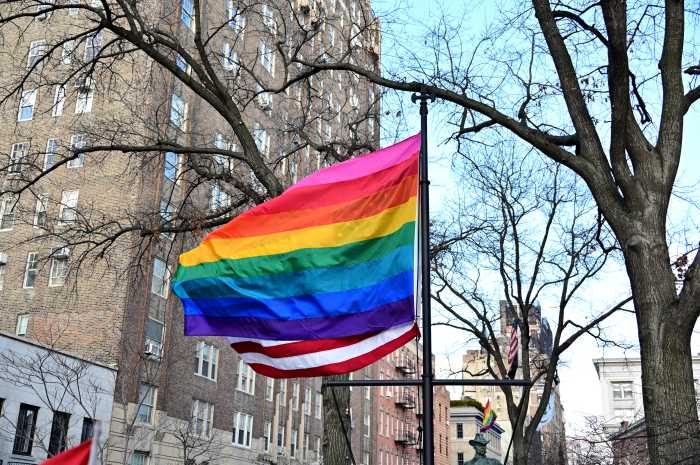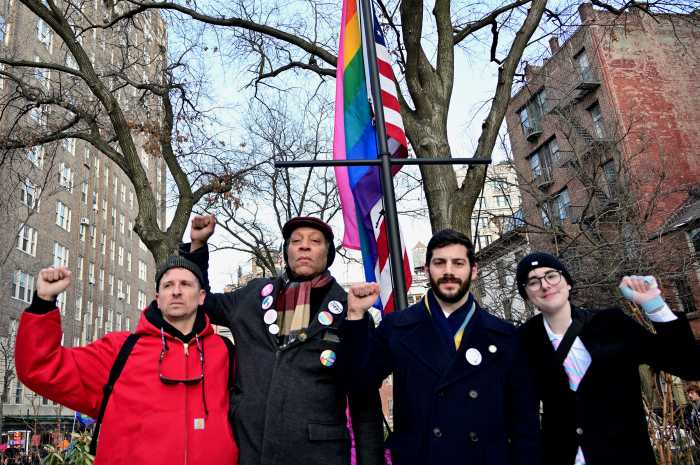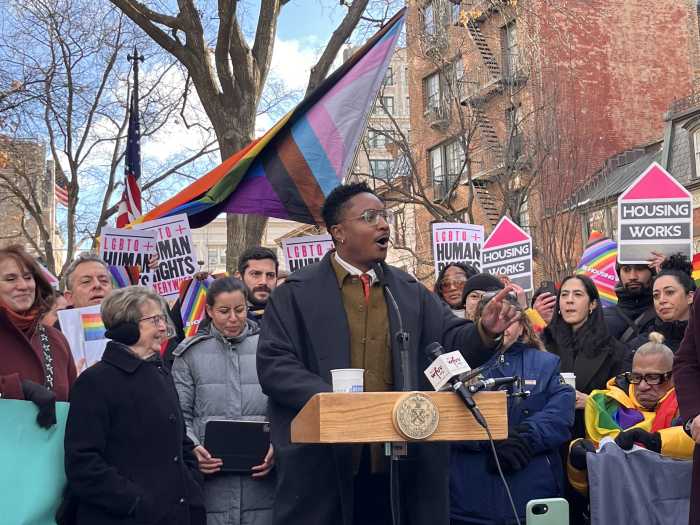Procedural vote on March 11 no indicator of amendment’s fate March 29
Coming on the same day that the California Supreme Court stepped in to halt same-sex marriages in San Francisco, the vote on March 11 by the Massachusetts Legislature giving preliminary approval to a state constitutional amendment defining marriage as the union of one man and one woman felt like the drop of the other shoe.
The amendment––which would overturn the November Goodridge ruling by the state’s Supreme Judicial Court to open civil marriage to same-sex couples but enact civil unions that its sponsors argue confer all the benefits of marriage under state law––faces a final vote on March 29, and would have to be approved again in the 2005-6 session of the Legislature, and by voters in November 2006 before taking effect. The preliminary vote was 129 to 69 in a joint session of the House and Senate sitting in a special constitutional convention.
But according to legislators on both sides of the amendment question, the preliminary vote is no firm indicator of its prospects when the constitutional convention reconvenes on March 29.
“We are exactly where we were before the March 11 vote,” Sen. Jarrett Barrios, an out gay Democrat from Cambridge who is helping to lead the charge in defense of the November court ruling, told Gay City News. “There is no clear majority for any course of action.”
“It is still extremely fluid,” according to Sen. Brian Lees, a Springfield Republican who is the minority leader and supports the effort by Democratic Senate President Robert Traviglini, to steer the amendment to final approval in this legislative session. “We did receive some support from those who only want gay marriage, and some from those who oppose any benefits. It’s an odd political moment when folks from the left and right use the same strategy. Everything is still open.”
According to Barrios, Lees, and other observers, the preliminary vote reflected strategic voting by several different factions, and consequently is no predictor of the battle’s final outcome.
In fact, gay marriage advocates are claiming a minor, even if momentary victory.
“It’s true that we did not score a solid victory on March 11,” said Sue Hyde, a Boston staff member of the National Gay and Lesbian Task Force who has been working with MassEquality, an ad hoc coalition of three dozen groups defending the Goodridge ruling. “The fact that we survived that day without an amendment reaching final approval was quite an accomplishment. We believe that we are building toward a solid victory, even though we are not sure how that will happen.”
All the uncertainty reflects not only the parliamentary nuances of the constitutional convention procedures, but also the three-way divide within the 200-member Legislature.
According to both Hyde and Barrios, pro-marriage forces in the Legislature command between 75 and 80 votes. Some of those votes, with the approval of MassEquality, peeled off to support the Traviglini amendment, for two reasons. First, the Traviglini approach, in simultaneously enacting civil unions, is preferable to a proposal championed by Bristol County Democratic Rep. Philip Travis that would strip gay and lesbian couples of marriage rights but offer nothing specific in return. Travis’ approach was similar to the original posture of the influential House speaker, Thomas Finneran, though he voted with Traviglini last week.
The preliminary approval of the Traviglini amendment also clears the agenda and makes possible a straight up and down vote, which could settle the matter for this year. Supporters of Goodridge hope to take advantage of divisions within the majority opposed to gay marriage to forestall any amendment progress this year.
Some of the most conservative members of the Legislature, including Republicans and Democrats and supported by GOP Governor Mitt Romney, oppose putting civil union rights into the state constitution and might be unwilling to give final approval to the Traviglini amendment. Others, Republican Senate Leader Lees included, refuse to move forward on any amendment that does not grant civil union benefits.
“If [the Traviglini amendment] doesn’t pass, I will not support anything more conservative. I will not support the governor,” Lees told Gay City News. “We have found how far some people will go to deny any rights. And I think there are others—more than before—that share that view.”
Thus, if both the conservatives and the moderates who share Lees’ perspective hang tight, stalemate could ensue––and that would be a win for gay marriage in Massachusetts.
“The victor will be the group that is creatively able to put together a coalition in a situation of ever changing coalitions,” Barrios said. “The group that is able to navigate the most flexibly. I think that anything is possible. I concur that stalemate may occur.”
When the constitutional convention meets on March 29 it will consider amendments to the Traviglini amendment, but once one amendment is passed, no others will be considered. As it happens, an amendment put forward by Lees and Traviglini, to tidy up the language of the draft approved last week, will be the first one considered. If the March 11 majority holds for that tinkering, the measure will then go to a final vote.
Lees said it is not unlikely that both conservatives and gay marriage supporters will then bail out of the majority and doom the amendment.
But Hyde sees continued risk of mischief––chiefly from Finneran, who made clear from the start that he would prefer an amendment that did nothing but take marriage rights away. If he were able to withhold enough votes from the Lees-Traviglini clean up amendment, he could then inflict some damage to the consolation prize of civil unions.
“The question is whether Mr. Traviglini and Mr. Finneran, who don’t like each other, are really collaborating, or whether Mr. Finneran, known for stunts, will pull a stunt at the last minute, and cut Traviglini off at the knees,” Hyde said. “And whether Republicans and conservative Democrats will work together.”
In order to increase the chances that the pro-marriage forces can withstand any amendment, MassEquality is working with a target group of about 26 legislators, trying to win them over to the gay marriage cause.
“They voted for the amendment because they felt pressed by their legislative commanders,” she said. “Or they voted for it because they saw we did not have enough no votes, and we were not close. They were saying get close and we will vote with you. Or because their constituents said we needed a referendum. Or because they think we are not strong enough to support them in tight races they might face. Or because the amendment was the best of a group of a bad alternatives.”
But Hyde conceded the difficulty of winning an outright gay marriage majority, and said same-sex advocates have been forced to adopt the “secondary strategy” of strategic voting, “which is the only strategy that seems to have a chance of success right now.”
Barrios is more direct. Asked about the chance of winning 101 votes for gay marriage by March 29, he responded, “It ain’t gonna happen.”
For his part, Lees seems resigned to the possibility of seeing no constitutional amendment advance this year, but also warns that gay rights advocates, if successful in forestalling an amendment, could spark a backlash by voters who might demand legislative action in the 2005 session regardless of whether or not civil unions were part of the package. According to Cheryl Jacques, a former Massachusetts state senator who now heads up the Human Rights Campaign, Lees played a key role in squelching legislative action on an anti-gay marriage amendment when it first surfaced in 2002, so his cautions should perhaps be taken as more than simple political posturing.
Hyde said that the fight over a potential amendment has brought out considerable grassroots activism and also broadened the coalition for gay rights in Massachusetts. She said that although the state AFL-CIO has not signed onto the anti-amendment effort, many large individual unions have, as had the respected advocacy group Health Care For All.
“It’s amazing how many thousands of people have been willing to sacrifice time, money, in some cases part of their family life to defend Goodridge,” she said.
Hyde explained that advocates have worked hard to keep a “Massachusetts face” on “our message, our messengers, and our pictures.” She said advocates cannot manage armies of out of state supporters descending on Boston, nor can those volunteers usefully follow up with legislators concerned with the views of their constituents.
She added that the anti-marriage forces may have blundered in bussing bodies in from around the nation.
“That did not play well,” Hyde maintained. “The legislators noticed people from Georgia standing on the steps of the State House with hate signs and they didn’t like it. That was an element that had not been in the debate in Massachusetts before.”
Hyde said that MassEquality is urging out of state supporters of Goodridge to contact people they know in Massachusetts to press them to lobby their legislators. She added that financial support is also appreciated and can be offered through MassEquality.org.



































